We three, we’re all alone
Living in a memory
My echo, my shadow, and me
– The Ink Spots, “We Three (My Echo, My Shadow, and Me)”
This sad refrain ushers us into Season 4 of Better Call Saul. As with all previous season premieres, “Smoke” (written by Peter Gould and directed by Minkie Spiro) opens with a black-and-white Gene sequence. It picks up right where we left Gene in “Mabel” (S3E1), passed out on the floor of the Cinnabon. The music choice here is reminiscent of the Season 1 opener, “Uno” (S1E1), which also used a song by The Ink Spots: “Address Unknown”. The scene echoes the “Uno” opener in other ways, too; it shows us bare cinnamon rolls waiting to be iced, an unmanned dough machine, an overflowing sink, and other objects that Gene had interacted with in previous episodes. But here, everything has been abandoned. There is no activity other than the EMTs working on a barely conscious Gene.
The choice of The Ink Spots’ “We Three (My Echo, My Shadow, and Me)”—a melancholic tune filled with longing for a love that exists only as a memory—reminds us that Gene himself is three men. Currently, he is Gene Tacavic, and he carries his echo and shadow (Jimmy McGill and Saul Goodman) with him through this lonely half-life he leads. But, at this point, do any of these men really exist in a meaningful way? Gene was never real, and Jimmy and Saul only exist as memories. It’s a painful reminder that, if Gene does die here, there will be no one to mourn him because, in many ways, he’s already died twice. As far as pining for a love lost, the song also asks the question: “where is the gal that I love?” It’s something Better Call Saul fans have been wondering since the very beginning: in this Omaha timeline (and the Breaking Bad timeline before it) where is Kim Wexler?
Gene is at the mercy of the EMTs and the emergency room staff. His attempts to fly under the radar have been shattered, and he’s left helpless in a hospital bed, waiting to be released and praying that he doesn’t get found out in the process. When a police officer approaches the nurses’ desk in front of his room, his heart rate goes through the roof. He thinks—this is it—but it isn’t. The doctor comes in and tells him that his heart (and everything else) is pretty much fine. He’s free to go.
But he’s not free, because there’s some sort of administrative problem and he’s forced to provide the admin with his driver’s license and social security number, both of which are very fake and very illegal. I, as a viewer, had a visceral reaction to the tension as Gene waits to see whether or not he’ll get busted. And it only gets worse, because once he’s free and clear (the whole thing just a typo on the admin’s part), he gets in a taxi with an Albuquerque Isotopes air freshener and a driver who looks at Gene like he knows all about his echo and shadow selves.
We’ve seen Gene panic over menacing strangers before, and it was just paranoia, but this is a very real threat. He decides to get out of the taxi before it gets to the mall. The driver stays on the street as he walks away, but doesn’t get out of the cab. Gene rounds the corner. He’s terrified and breathing deeply. And that’s the end of Gene for this season—at least, I assume so. I savor every second of Gene content we are given and this section of the Omaha story is no different, but it was the most anxiety-inducing 8 minutes of television I’ve seen in quite some time.
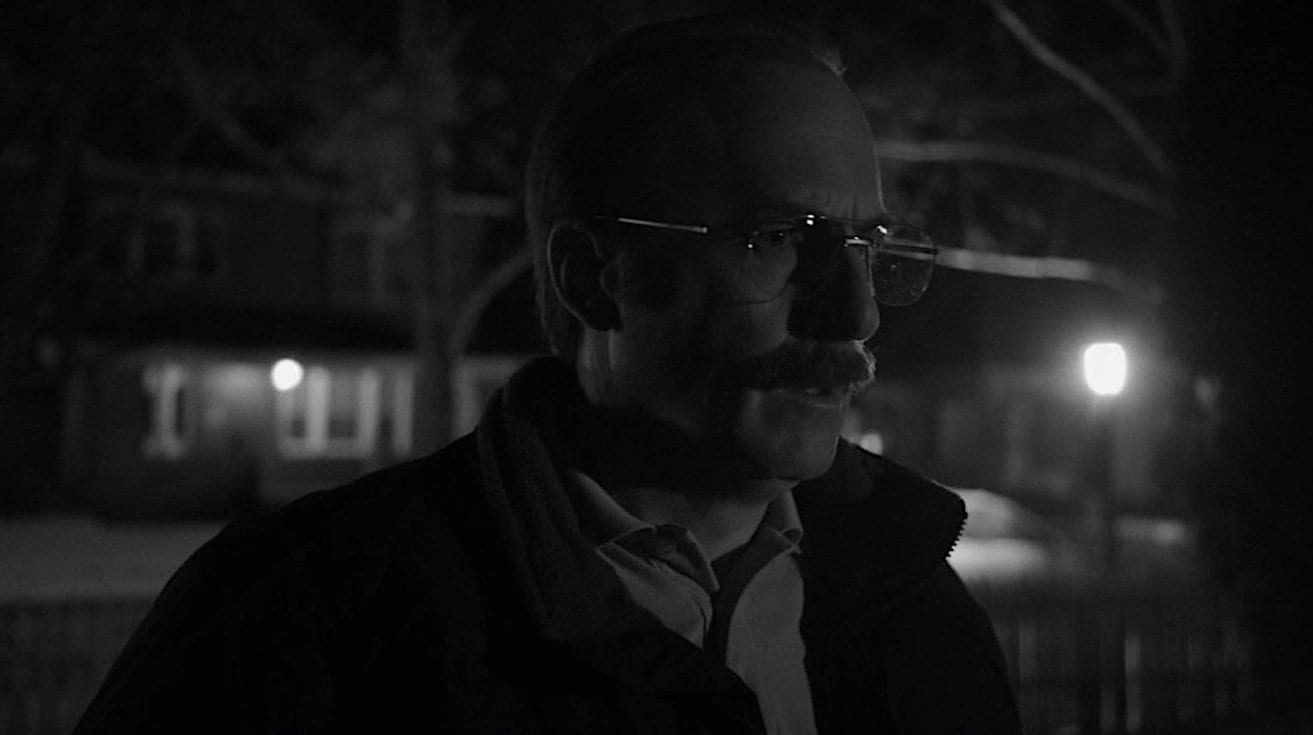
Back in the Better Call Saul timeline, burning embers creep across Kim’s silent apartment as we wait for Jimmy to find out about Chuck’s death. The information comes via a phone call from Howard, and Jimmy and Kim rush to Chuck’s house only to find a burnt-out husk of what once stood there. The always calm-cool-and-collected Howard is absolutely devastated as the coroner’s van pulls away. As for Jimmy, he’s not as visibly distraught as Howard. He’s clearly still processing it. He sits on the bench outside Chuck’s house—the same one he sat on, barefoot with Chuck in “Pimento” (S1E9), before everything went off the rails between them—and stares at the utility pole that Chuck had always agonized over.
Kim tells him what the fire department has reported to her: the fire started from a lantern in the living room and Chuck died quickly of smoke inhalation. Jimmy believes that just about as much as I do, which is not at all. With that charred house as a backdrop, it’s impossible not to think about the gruesome reality of Chuck choosing to burn himself alive.
Since all of Chuck’s electronics were in the yard, Jimmy knows that Chuck had a relapse after the last time they saw each other, less than a week earlier. He doesn’t know exactly what triggered it, but in all likelihood he assumes it was at least tangentially related to something he did. I think Jimmy knows from the very beginning that Chuck’s death was not accidental, but he’s still in shock and unable to really articulate his feelings. In fact, throughout this episode—up until the very end—the ever-loquacious Jimmy McGill is struck dumb by Chuck’s death.
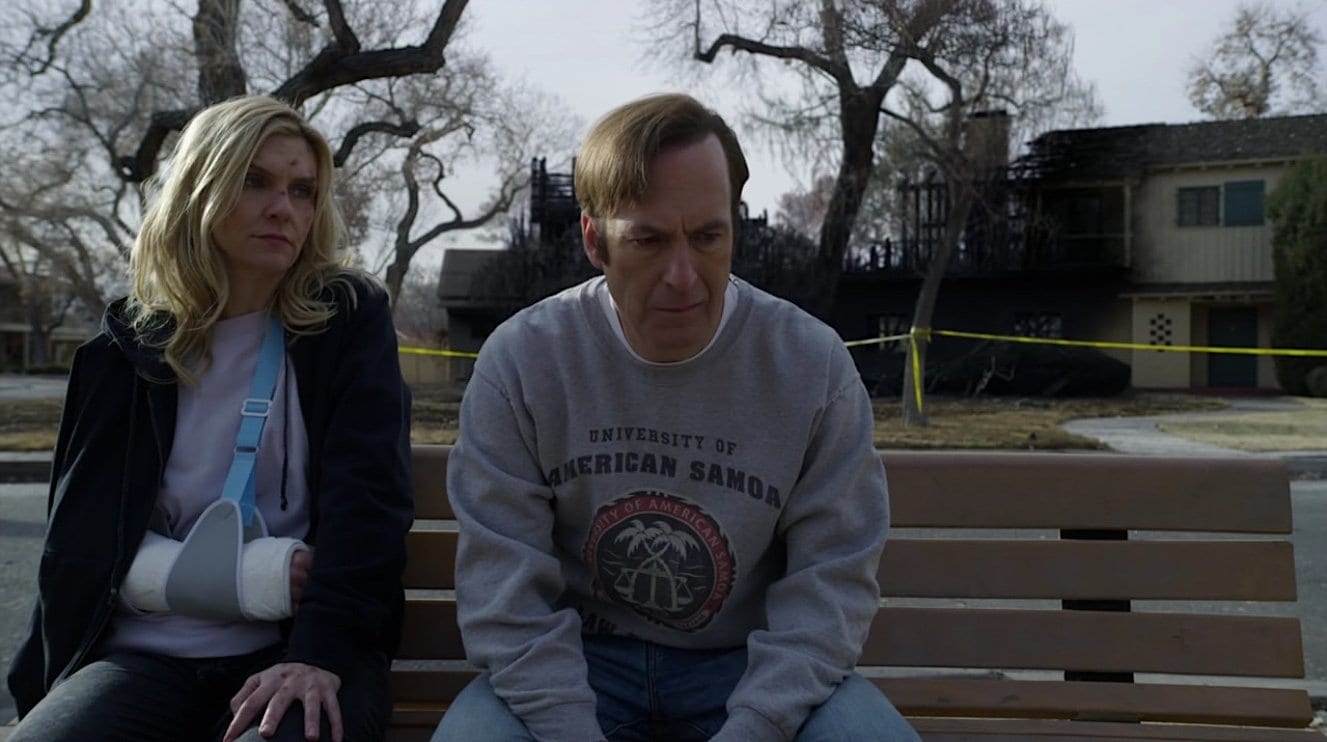
Later, at home with Kim, he’s still silently lost in his own thoughts when Howard calls to read him the proposed obituary for Chuck. It’s a laundry list of Chuck’s many accomplishments, both academic and professional (including the interesting tidbit that Chuck graduated from high school as valedictorian at age 14). Conspicuously absent from what Jimmy hears of this obituary is any reference to personal connections beyond his birth parents. It’s all about Chuck’s intelligence and his legal prowess, which is not surprising since Howard wrote it. The obituary forces us to remember the fact that, in the end, Chuck had no personal bonds (save Howard), and when Howard forced him into retirement, he had absolutely nothing to live for.
Jimmy is listening halfheartedly because he doesn’t particularly care about the details of the obituary or funeral arrangements or any of that. He’s very much in his feelings and drowning out the rest—until Howard reads the line: “No matter the case, Charles was known for his precise, clear arguments and his profound devotion to the to the highest ideals of the law.” At that, Jimmy has had enough. It hits a little too close to home and he puts the phone down and walks away, leaving Kim to give Howard the OK to run the piece.
Comforting a grieving loved one is a near-impossible task even when the situation isn’t complicated by hard feelings and past betrayals. Kim doesn’t know what else to do but get drunk so she unpacks a bottle of Zafiro Añejo—the same bottle Jimmy had originally purchased to celebrate getting his cut of the Sandpiper money. That celebration never happened because Kim turned it down just before getting in her accident, and there hasn’t been much to celebrate since. Throughout this whole scene, Kim doesn’t speak at all. She just pours shots and motions for Jimmy to sit next to her. The scene transitions into morning, with Kim asleep on the couch and Jimmy still awake in the exact same position. The bottle of Zafiro is empty, but unlike the last time they polished off a bottle together—during their night out as Giselle and Viktor St. Claire—there is no joy or satisfaction to be had here.
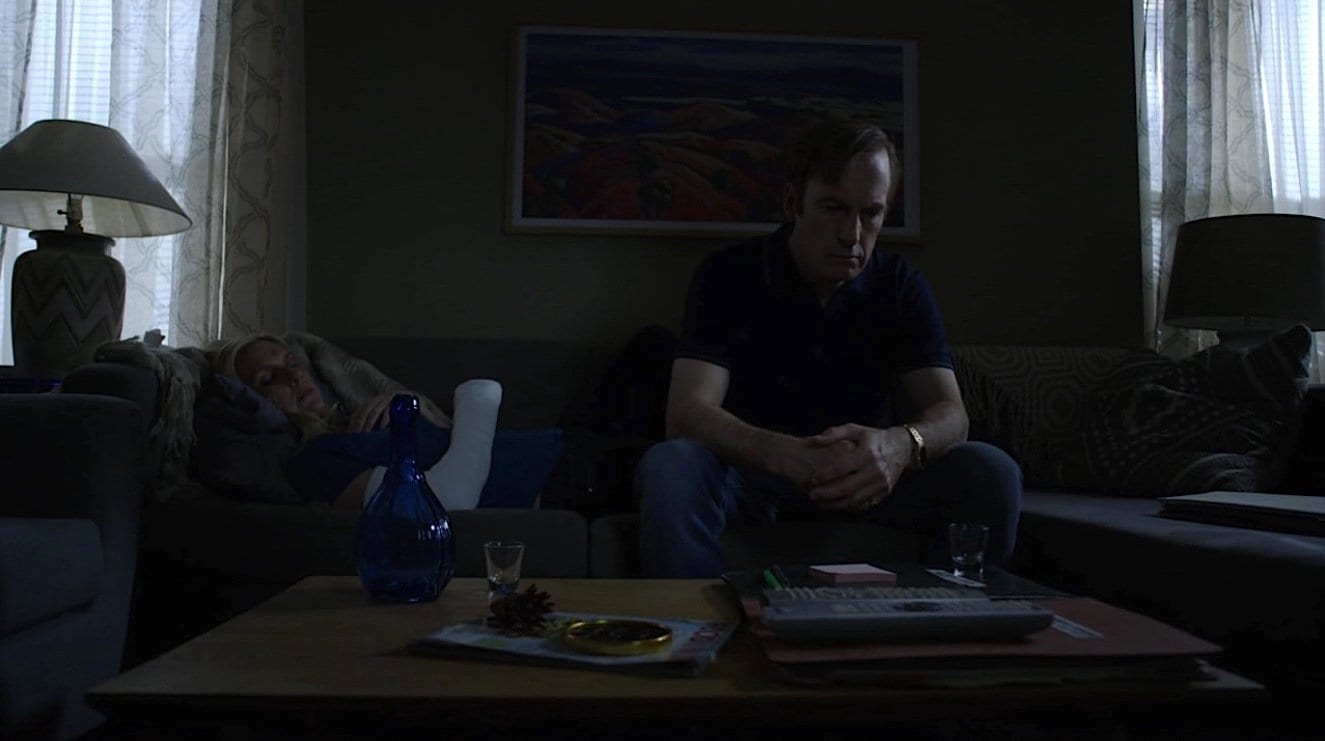
We find Mike Ehrmantraut also suffering from some level of dissatisfaction. He’s handed in his parking attendant windbreaker and moved on to bigger and better things: gardening with Kaylee. Now that he makes his own hours, he is able to pick Kaylee up from school and spend time with her, lightening Stacey’s load. Stacey seems a bit curious about his new job but she’s grateful for the help. At this point, she knows not to ask Mike too many questions because she probably doesn’t want to know the answers.
Mike receives his first paycheck from Madrigal—a hefty sum—but while he initially seems pleased at the money coming in, he ends up a bit bothered. All alone, he’s got nothing to do but bide his time watching baseball until he can see Kaylee again. Madrigal is paying him, but he doesn’t have an actual job. It is likely the first time in Mike’s entire life that he hasn’t had to go to work. He decides he needs to do something and gets the contact information for Madrigal’s facility in Las Cruces.
After stealing the security pass and draining the car battery of a Madrigal employee, he goes to poke around the Las Cruces office and warehouse. I initially assumed that Mike was up to something sinister but it turns out he was just doing the job he was hired to do (at least on paper): acting as a security consultant. I think there are several reasons he chooses to do this: to make sure his money looks legit in case anyone looks at it too closely, to check out the Madrigal operation and get a better idea of who he’s in business with, and to combat his boredom.
Mike’s stint at the parking garage was not particularly stimulating, so I can see how the chance to exercise his mind would appeal to him more than sitting around the house watching TV and waiting for Kaylee. Mike is, after all, a policeman at heart, and he always needs a problem to solve. In this case, the problem is Madrigal’s flawed security procedures. Mike is nothing if not thorough, and if he is to be associated with Madrigal in any way, he wants to make sure that they are up to his exacting standards. Mike Ehrmantraut leaves no room for error.
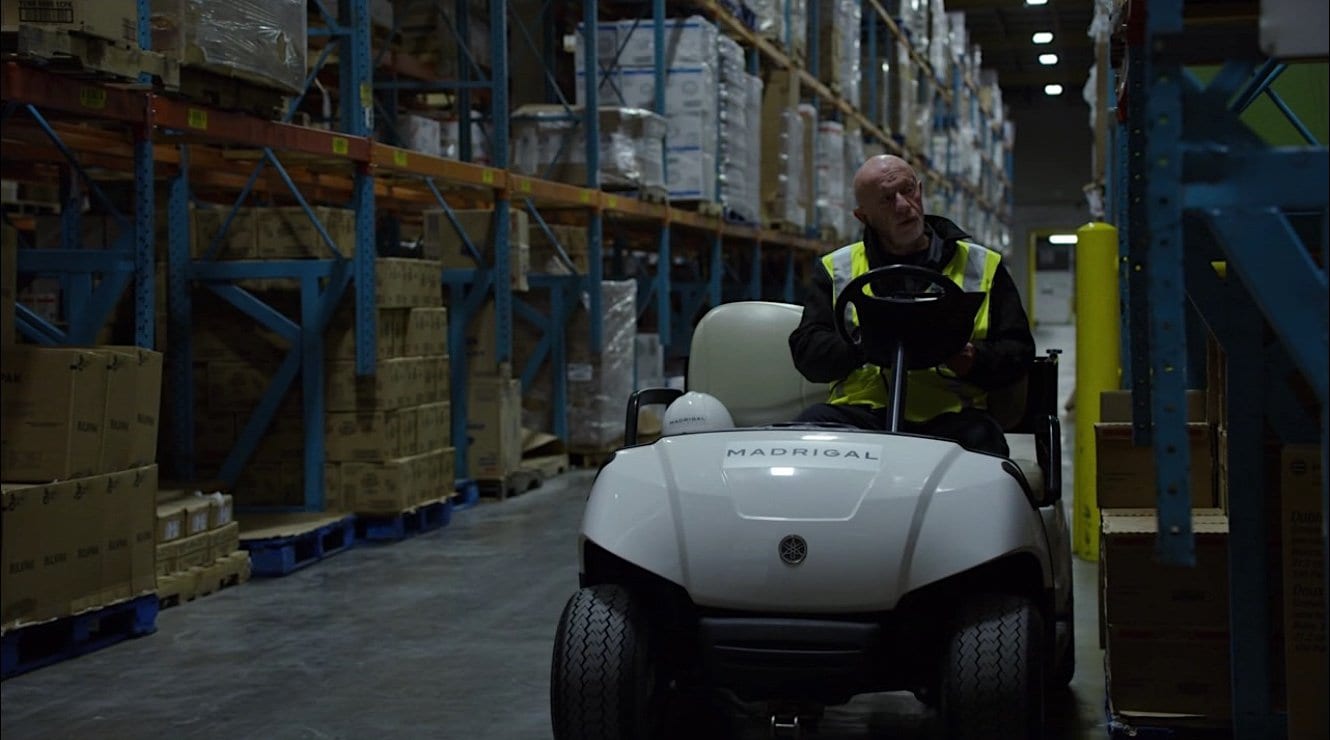
When Mike approaches the manager about the many security issues he’s come across, the man (understandably) has no idea who he is. Mike’s response: call Lydia Rodarte-Quayle. At this point I have to wonder if, on top of everything else, Mike is doing all this to get Lydia’s attention. I can’t imagine Lydia is going to be too pleased to find out that Mike is actually taking his security consultant position seriously. Lydia doesn’t like complications; she just wants Mike to cash his checks and go about his business. The fact that he’s actively snooping around in Madrigal business is not going to go over well with her. However, there’s one person I can see being very impressed with Mike’s diligence: Gus Fring.
Speaking of Gus, we find him exactly where we left him, with Nacho after Hector’s collapse. Nacho is talking to the EMT and gives her the (real) pills, and Gus glances at them like he knows something is up. Nacho is desperate to get rid of the fake capsules and while Gus is on the phone with Juan Bolsa, he spies a grate in the dirt nearby. Unfortunately for him, he’s unable to ditch the pill bottle before Gus tells him he’s been summoned by the boss.
They meet at a Pollos warehouse and Bolsa wants to make it crystal clear to all parties involved that even though Hector is incapacitated by his stroke, everything is to remain business as usual. He doesn’t know Nacho but Arturo vouches for him as “Tuco’s man.” Regardless, Bolsa doesn’t seem to trust Nacho. He fears, not without reason, that this incident might present an opportunity for someone to try to move in on Salamanca territory—possibly Nacho trying to strike out on his own. Once Nacho and Arturo leave, Bolsa asks Gus what he thinks. As usual, Gus has his own secret motivations and knows more than he is letting on—about Hector and about Nacho—but what he tells Bolsa is not only true but an accurate foretelling of future events: “Someone will move against the Salamancas. Which brings war. Which brings chaos. Which brings the D.E.A.”

After leaving the meeting, Nacho drives to a bridge and ditches the fake pills in the river below. He may think that Gus is suspicious of him, but he doesn’t know to what extent. What he doesn’t know is that Gus has a tracker on his car and that Gus’s man, Victor, is following him and watching his every move. At this point, Nacho’s main concern is the safety of his father. He can’t have anyone knowing that he is (at least partially) responsible for Hector’s stroke. With Juan Bolsa in the picture now, he’s very much on the cartel’s radar, and one false move will get him and his family killed. It remains to be seen whether Gus will align himself with Nacho. After all, any enemy of the Salamancas is a potential friend of Gus’s.
We say a final farewell to Chuck McGill at his funeral, to the tune of Gabriel Fauré’s “Sicilienne, for cello & piano, Op. 78”—the same song Chuck played on the piano from Rebecca’s sheet music in “Cobbler” (S2E2). With the exception of the blurred photograph of Chuck in the background behind Jimmy and his image on the prayer card, Chuck is very much absent from the funeral scene. There’s no open casket or eulogies or any of that. Instead, the scene is about the people who Chuck has left behind.
It is interesting to note that the parade of well-wishers in front of Jimmy are all work colleagues and associates. Cliff Main, Rick Schweikart, and several HHM employees file past as Jimmy perfunctorily thanks them for coming. Kim is right by his side for support, as she always is, but she’s not particularly emotional with regard to Chuck’s death. Her concern is for Jimmy and Jimmy alone. There are only two family members present: Rebecca and Jimmy, and even Rebecca has been estranged for years. Still, Rebecca is openly crying, but it isn’t Jimmy who comforts her; it’s Howard. He hands her a handkerchief and gives her a reassuring pat on the shoulder. He looks absolutely gutted, much more so than Jimmy.
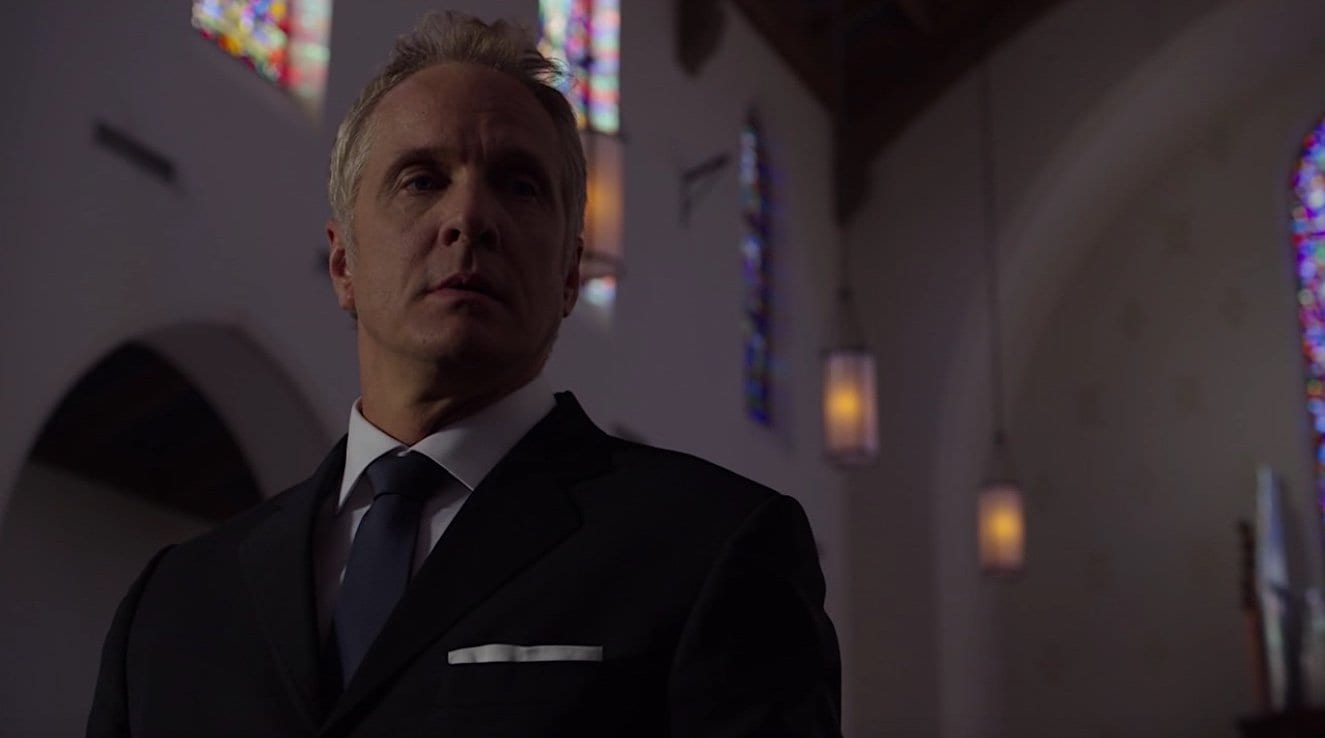
Jimmy and Kim drive home in silence. In fact, there is very little dialogue between the two in this entire episode. Kim knows that there’s nothing she can say to make Jimmy feel better—not after everything that’s happened—but it’s more than that. They often communicate without words, but this is different. There is an intimacy, but it is based in their shared guilt and complicity. They know what they did, and there’s no taking it back. There’s no chance of forgiveness or healing. Chuck is dead, and there’s really nothing left to say.
Howard is waiting for Jimmy and Kim on the curb outside her apartment building because he has some painful truths to share with Jimmy. Howard knows full well that Chuck’s death was no accident and believes that it is his fault. He tells Jimmy that Chuck’s “retirement” was nothing of the sort—that he pushed Chuck out of HHM after their argument over how to handle the malpractice insurance increase. When Jimmy learns about the insurance situation (which he is directly responsible for) something in him snaps. He takes in the knowledge that Chuck’s suicide is his fault while at the same time deriving a perverse pleasure from letting Hamlin believe that it is his “cross to bear.” It wrecks Howard and shocks Kim, who grows even more disturbed as Jimmy gets up to feed the goldfish and make some coffee, whistling like he hasn’t a care in the world. Jimmy’s behavior is truly heartless, and made all the more shocking by the fact that he’s willing to do it in front of Kim.
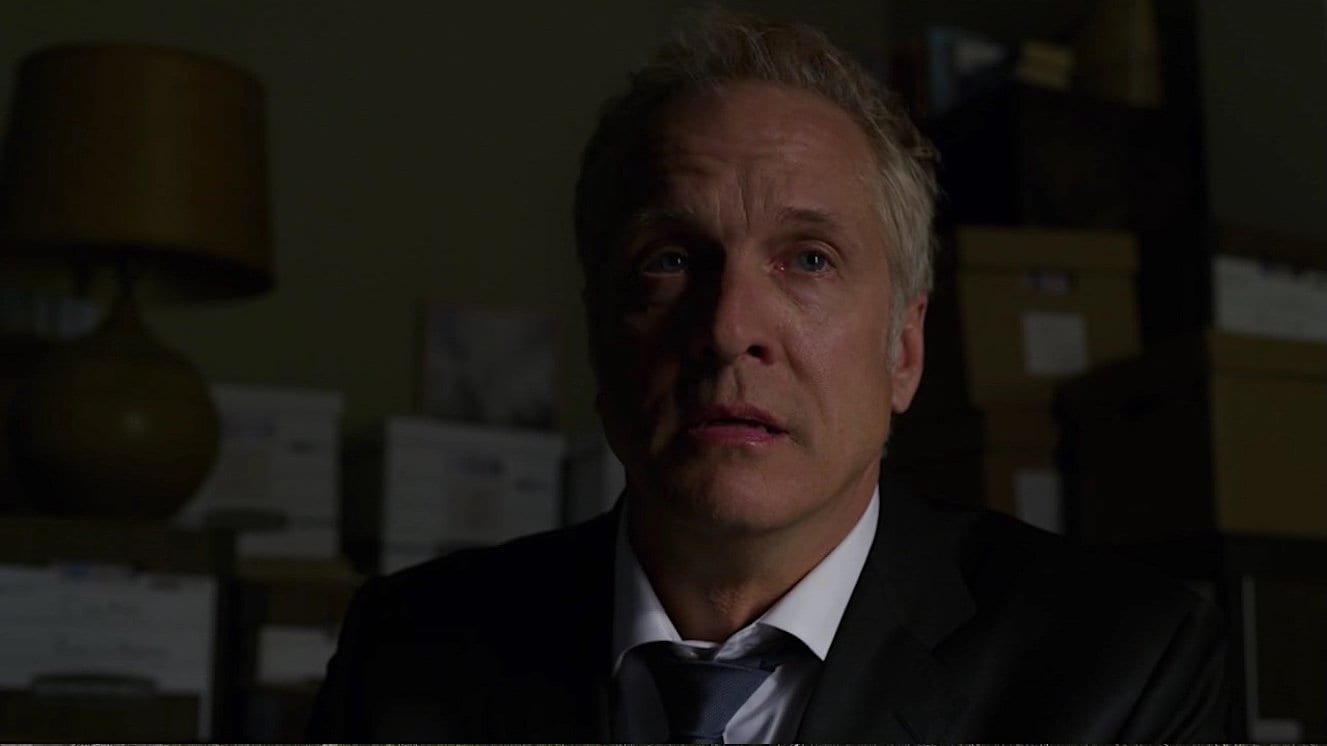
It makes some sense that Jimmy would enjoy laying all the responsibility on Howard. Their relationship has been strained for years, despite the fact that Jimmy now knows that many of the things he blamed Howard for were Chuck’s doing. But, to Jimmy, Howard is the one that Chuck always wanted—as a partner and as a surrogate son. At this point, I don’t think it’s a stretch to assume that Howard’s father is dead and that Chuck took on that role in his life. Chuck has no children of his own. He was forced to take on a father-figure role with Jimmy after their actual father’s death, but he never wanted it. He took on Howard by choice—his golden child—and in the end he felt that Howard betrayed him. Howard knows it, and now Jimmy knows it, too. So why not let Howard feel the full weight of the guilt and let him be the one to mourn like a blood relative should?
Instead of the guilt swallowing him whole, Jimmy’s realization that he is responsible for Chuck’s suicide—as much as anyone can be responsible for someone else’s decision to end their own life—seems to have set him free. His (and Kim’s) Chuck Problem is resolved, albeit by the most horrific means possible. Jimmy no longer has to factor Chuck into any of his decisions or choices. He doesn’t have to feel Chuck’s disappointment. He doesn’t have to fear any sabotage of himself or of Kim. They are safe. They got away with it. If that makes him the bad guy, so be it, as long as someone else takes the blame.
But what exactly will Jimmy choose to do with this freedom in the short-term? And how will Kim handle it? She carries much of her own guilt and regret over the situation with Chuck and the role she played in what happened to him. We all know we are on a collision course with Saul, and we’re closer than we’ve ever been at the end of “Smoke.” But is this the breaking point? Are we seeing the death of Jimmy right alongside the death of Chuck? I’m not sure. At this point, Jimmy’s relationship with Kim is the last thing anchoring him to the man we know as Jimmy McGill. Whatever happens, it’s clear that in order to get to Saul Goodman, he’ll need to either sever that tie or drag her down with him.

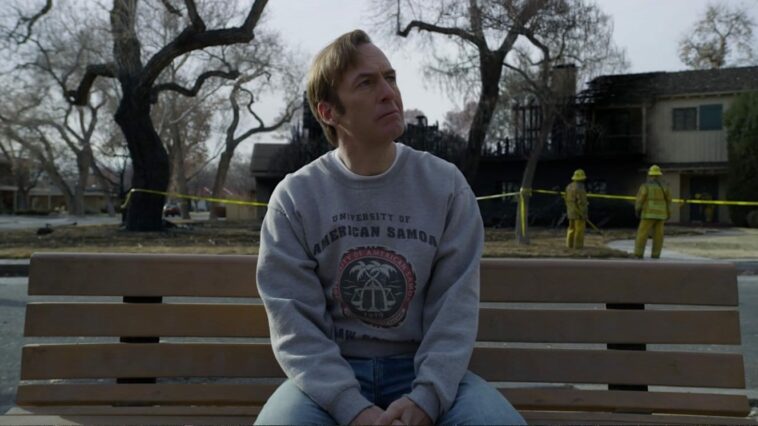
E-lec-tric-ity
E-lec-tric-ity